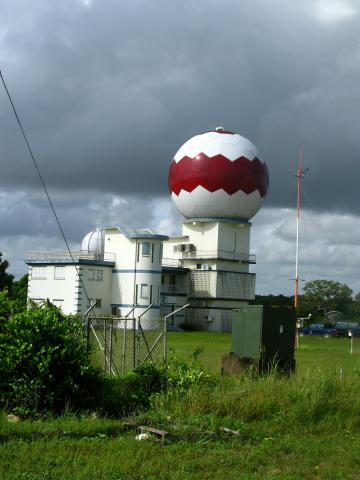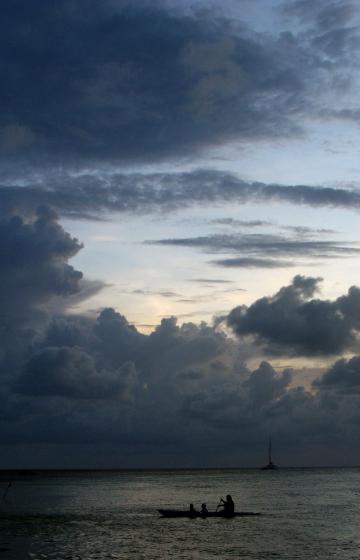Future Matters: Ethnography of Weather and Climate Knowledge and Forecasting
AnthFOR roundtable, American Anthropological Association meeting, Washington DC Nov 30 2017
AnthFOR members gathered at the 2017 American Anthropological Association meeting to discuss the production, circulation and use of weather and climate knowledge. In this popular roundtable session, panellists Heather Lazrus (NCAR), Dan Murphy (University of Cincinnati) and Sophie Haines (University of Oxford) introduced a series of themes for audience discussion, drawing on ethnographic experiences and encouraging reflection on how anthropology can contribute to understandings of - and interventions in - atmospheric prediction and preparedness.
We are extremely grateful to all of those who attended the session, contributed to the discussion, and challenged us to move the conversation forward.
Times and spaces of forecasting
Dan Murphy traced connections between technologies of forecasting, and people’s memories and lived experiences. Framings and perceptions of time can differ according to locations and livelihoods (mining in Ohio, ranching in Montana, fishing in Tuvalu, farming in Belize). Murphy’s observations of scenario planning activities reveal how seasonality, market cycles and other factors contribute to a sense of time that in turn influences how people plan and manage resources.
In Montana, Murphy’s research showed that ranchers and business owners have an ingrained sense of what kind of place they wanted the scenarios to describe. Public lands managers and agency personnel had a very different sense of place - as something amenable to forest service mission statements. These differences produced friction as people debated possible and desirable futures. Ethnographies conducted elsewhere in the world show that speaking about the future in non-western contexts often implicates non-human agents. How might we speak for or about other beings, and broach ontological and epistemological questions about the nature of time itself?
The discussion also touched on how cultural knowledge of space and time can be included in weather warnings, for example relating the scale of a potential flood event to meaningful points of reference. People may have multiple experiences of time, based not only on their livelihood and location but on the activity or priority they are focused on at a particular moment. We were also challenged to pay attention to what might be obscured by focusing on making forecasts locally meaningful for particular communities: we should not lose sight of the structural and slow violence of climate change and must continue to think critically about the role of information in vulnerability, intervention and responsibility.
Evidence, trust and expertise
Sophie Haines asked us to consider what counts and what does not count as authoritative evidence, and how people and organisations tackle trust, uncertainty and non-knowledge. These questions echo foundational anthropological concerns: explaining misfortune, apportioning blame and credit, and finding stability in an uncertain world. Thinking with studies of magic, witchcraft and divination can help explore relationships between knowledge and action. Along with science studies scholars, we can also critically explore notions of co-production and black-boxing of knowledge.
Haines’ research has explored what happens when different kinds of evidence and expertise are brought into conversation. Debates about developing climate services for agriculture in Belize reveal political and cultural differences that go beyond the technical and practical dimensions of forecasts. In northern Kenya, attempts to ‘integrate’ the knowledge of meteorologists and ritual specialists pose crucial questions about knowledge translation and the politics of participation.
Discussions with the audience explored the potential of opening up data collection and instrumentation to different communities. The Rising Voices network is one initiative that brings physical scientists and indigenous communities together to talk. As well as indigenous and farming communities, anthropologists should also consider ‘the local’ within capitalism and science. The question of agency in the creation of weather sparked debate about translating knowledge systems and taking alternative explanations seriously.
Working across disciplines and domains
Heather Lazrus called on the group to consider how diverse knowledges are created through engagements in different arenas. One way to think about this is in terms of western disciplines and interdisciplinary knowledge: physical and social sciences coming together to create new knowledge that could not be created by any one discipline alone. This may work particularly well when based on a problem, rather than a specific method or theory, and when collaborators who may not understand your tools still value your contributions.
Lazrus drew attention to language: as anthropologists we often take 'forecast' to include a wide variety of practices, whereas physical science colleagues may use a more technical definition. By starting from shared understandings of ‘vulnerability’ or ‘culture’ we can later expand the scope, for example recasting ‘exposure’ to take account of histories of colonialism that have placed people in vulnerable locations.
Even within anthropology there are many different approaches to bringing knowledge systems together: from databases to trust-building conversations (as in Rising Voices). The latter can forge a deeper level of understanding, beyond assumptions that everyone has the same knowledge. At the recent COP meetings, some indigenous communities stated that they have reached a point where they don't need culture brokers any more.
There is a scope for anthropologists to influence how forecasts are created and disseminated. We should start with fundamental questions, and think about forecasting not just in terms of whether a physical hazard is going to emerge, but what the impacts and experiences might be. Underpinning all this are questions about how different cultures deal with uncertainty and make it meaningful and useful.

Belize Met Service HQ
S Haines

Caye Caulker evening clouds
S Haines
Anticipating and making worlds
The closing discussions developed the conversation about linking ideas and actions. Participants noted the importance of examining how people respond and explain when forecasts and other practices don’t work, and considering the moral dimensions of responsibility and blame that circulate in the aftermath of disasters. There may be ethical implications if communicating science devalues other ways of knowing and responding to uncertainty. Thinking anthropologically about weather and climate forecasting can illuminate views on how society should be organised, why the sun rises in the place that it does, and how worlds are made under shifting conditions.


